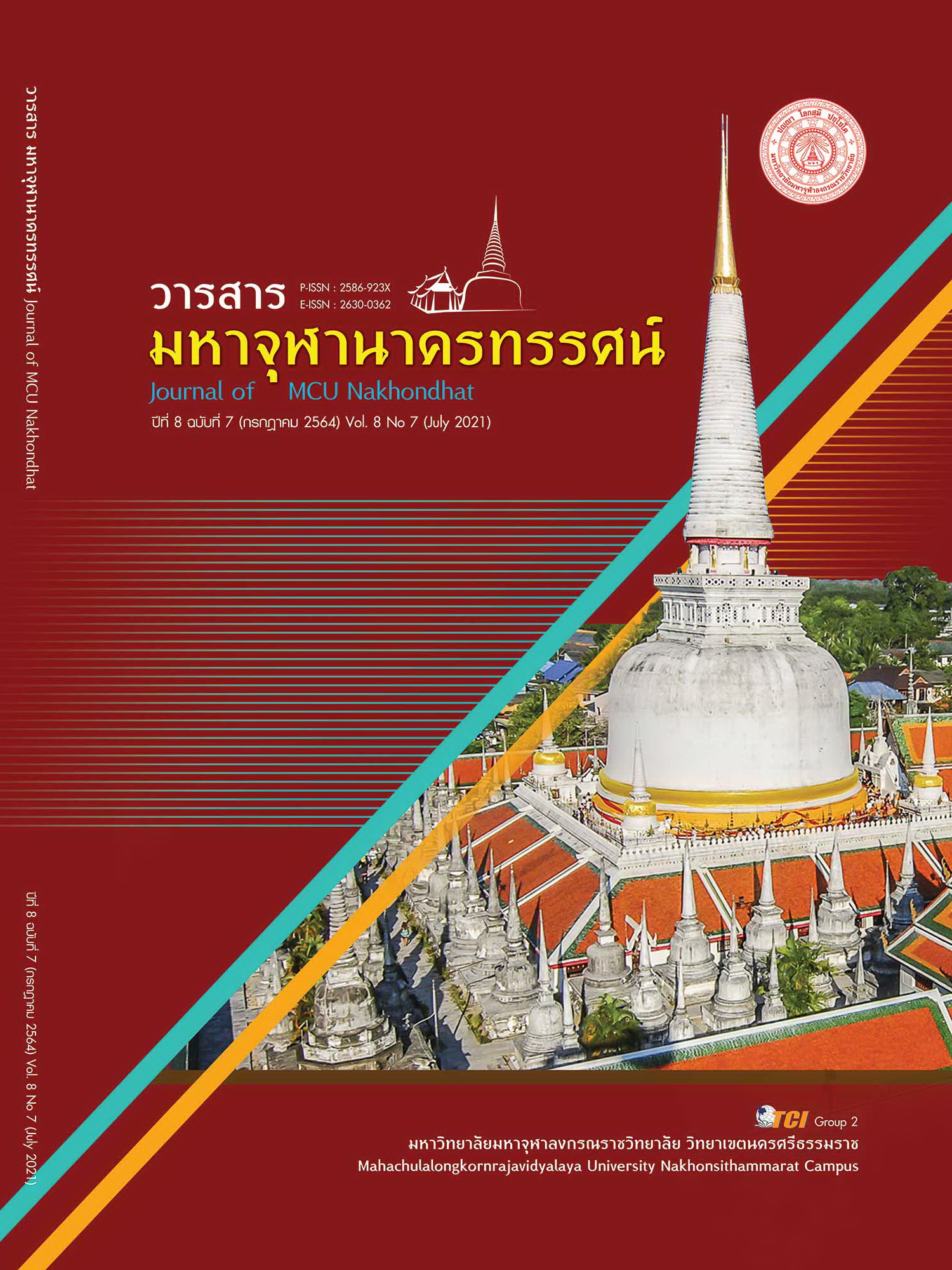THE STUDY OF PUBLIC WELFARE OF DEVELOPER MONKS ON LIFESTYLE BEHAVIORS TOWARD THREEFOLD TRAINING AND SANGGHAVATTHU 4 AND WELL-BEING OF COMMUNITY
Main Article Content
Abstract
This mixed method research article aimed to 1) study of public welfare of developer monks who are deal with this issue in social well-being prototype areas, and 2) study of lifestyle behavior according to the Buddhist threefold training, the Sangahavatthu 4 and well-being of people who lived in the prototype areas. The 468 samples were 18 developer monks and 450 people who lived in the prototype areas. Research instruments were lesson learned interviews, questionnaires on threefold training and Sangghavatthu 4 lifestyle behaviors and questionnaires of well-being which had reliability of 95% and 90% respectively. The data were analyzed by baseline statistics: frequency, percentage, mean, standard deviation, and constant comparison for qualitative data. The results revealed that the developer monks not only had the role of Buddhism propagation but also, they had the role of public welfare at level of assistance or grant, especially who influenced the covid-19. Moreover, the developer monks had operated public welfare on well-being and age group management and Buddhist oriented economy system development at a high level. For threefold training and Sangghavatthu 4 behaviors of people in the prototype areas was at a high level as well as the well-being of people. The study also found that psychological well-being of people in the prototype areas was moderate level, people had stress and anxiety about their actual daily life and was bored about living at moderate level. Consequently, the public welfare according to threefold training and Sangghavatthu 4 principles of developer monks will assist people overcome this crisis
Article Details
References
เดชชาติ ตรีทรัพย์ และคณะ. (2559). การนำหลักไตรสิกขามาใช้ในชีวิตประจำวันของประชาชนเทศบาลตำบลไม้เรียง อำเภอฉวาง จังหวัดนครศรีธรรมราช. วารสารมหาจุฬานาครทรรศ์, 3(2), 14-26.
พระครูประภัสร์สิทธิคุณ (ประสิทธิ์ ปภสฺสโร). (2555). บทบาทของพระสงฆ์ด้านการสาธารณสงเคราะห์ของคณะสงฆ์อำเภอจตุรพักตรพิมาน จังหวัดร้อยเอ็ด. ใน วิทยานิพนธ์พุทธศาสตรมหาบัณฑิตสาขาวิชาพระพุทธศาสนา. มหาวิทยาลัยมหาจุฬาลงกรณราชวิทยาลัย.
พระใบฎีกากิตติพงษ์ สีลสุทฺโธ และสุชน ประวัติดี. (2563). การปรับพฤติกรรมสุขภาวะองค์รวมของมนุษย์ในสังคมไทยกับโรคโควิด-19 ตามหลักพุทธจิตวิทยา. วารสารมหาจุฬาวิชาการ, 7(3), 85-96.
พระมงคลวชิรกร. (2561). คู่มือการปฏิบัติงานฝ่ายสาธารณสงเคราะห์ของมหาเถรสมาคม. กรุงเทพมหานคร: สำนักงานฝ่ายสาธารณสงเคราะห์ มหาเถรสมาคม.
พระสุนทร ธมฺมวโร (บุญคง). (2560). การประยุกต์ใช้หลักสังคหวัตถุ 4 ในชุมชนวัดหนองสนม จังหวัดระยอง. ใน วิทยานพิพนธ์พุทธศาสตรมหาบัณฑิต สาขาวิชาพระพุทธศาสนา. มหาวิทยาลัยมหาจุฬาลงกรณราชวิทยาลัย.
พินิจ ลาภธนานนท์ และคณะ. (2562). ชุดความรู้สาธารณสงเคราะห์วิถีพุทธ เล่ม 2: แนวคิดพุทธศาสนาเพื่อสังคม สังคหธุระ และสาธารณสงเคราะห์วิถีพุทธ. นนทบุรี: นิติธรรมการพิมพ์.
พิรญาณ์ แสงปัญญา และพินิจ ลาภธนานนท์. (2546). พุทธศาสนาเพื่อสังคม: บทบาทพระสงฆ์ด้านงานสาธารณสงเคราะห์ กรณีศึกษาพระราชธรรมนิเทศ (พระพยอม กลฺยาโณ) วัดสวนแก้ว จังหวัดนนทบุรี. วารสารมหาจุฬานาครทรรศ์, 8(3), 288-302.
สำนักงานพระพุทธศาสนาแห่งชาติ. (2562). ข้อมูลทะเบียนวัด ณ เดือนมกราคม พ.ศ. 2562. เรียกใช้เมื่อ 12 มิถุนายน 2563 จาก http://www3.onab.go.th/2019/02/12/ wattotalsummaryreport31012562/
สุริยนต์ น้อยสงวน. (2561). รูปแบบการปฏิบัติงานสาธารณสงเคราะห์ของคณะสงฆ์ในจังหวัดศรีสะเกษ. วารสารสันติศึกษาปริทรรศน์ มจร, 6(ฉบับพิเศษ), 383-394.
Cheng, T. C. et al. (2020). The Impact of COVID-19 on Subjective Well-Being: Evidence from Singapore. Bonn: Institute of Labor Economics.
Krejcie, R. V. & Morgan, D. W. (1970). Determining sample sizes for research activities. Educational and Psychological Measurement, 30(3), 607-610.


